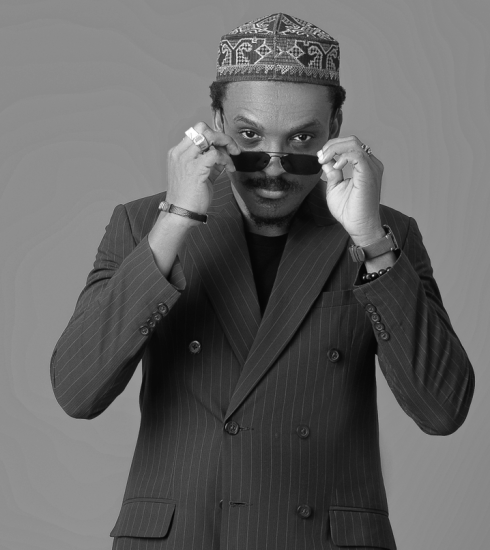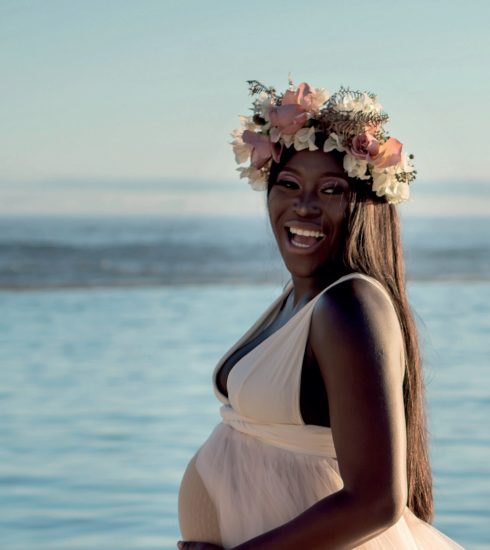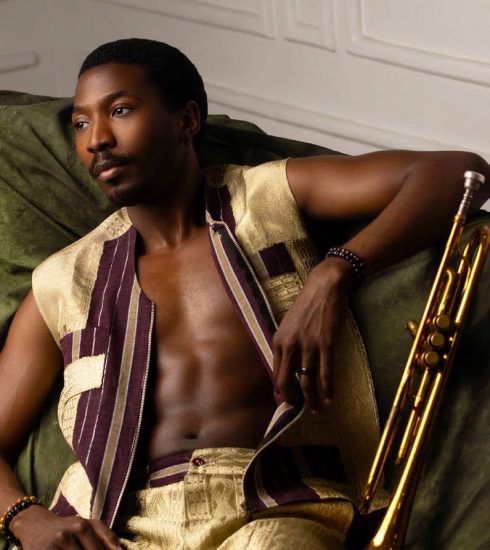In Character With Nancy Isime & Daniel Etim Effiong
Love is one of the most powerful forces on earth. When it comes in the form of a romance, it becomes more spell-binding. All around the world, humans have been telling the tales of romance through different art forms and media. However, motion picture stands out as an art form as it is able to depict the facial expressions and body language that resurrect the butterflies in the audience’s belly—it is not an easy feat.
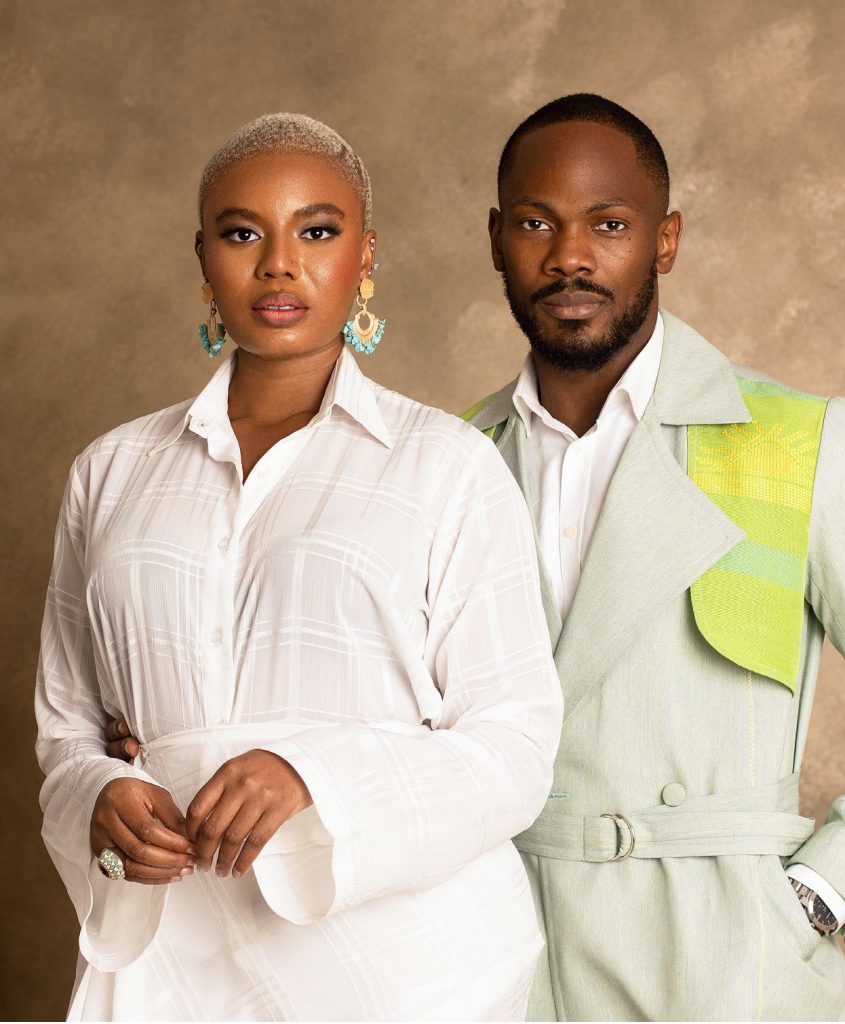
Nancy & Daniel
In Nollywood, we have seen an evolution of the romance genre courtesy of more diverse and relatable storylines, with last year’s romantic drama, Superstar, being an embodiment of that. To discuss what it feels like playing love interests on set and giving their respective characters so much life that it mirrors the beauty, and sometimes ugliness, of real-life romantic relationships, DOWNTOWN Writers, Tilewa Kazeem and Kehindé Fagbule sat with the Superstar co-stars, Nancy Isime and Daniel Etim Effiong.
Nancy Isime
It’s easy to ask “who is Nancy Isime and why has she suddenly become a leading and recurrent face of Nollywood?” because jumping the gun and questioning the magnitude of success when it hits you hard is quotidian to most humans in this part of the world. But a little research and due diligence would unravel that this blondie is hardly just your run-of-the-mill, here-today-gonetomorrow actress. Motivated by her years of extreme thirst for success and habitual drive to work, this shy but effervescent Edo-born media personality is a pleasant din that has been brewing for 10 years. This dernier cri of Nigeria media and entertainment discusses how it all started, riding bikes and a perhaps lover.

How did it all start for you?
I started as a model on the runway and a director saw me and thought, ‘ok, you should come audition for a role in our new series’. I auditioned and I got the role. That was how it started for me. It was never a case of ‘oh my God, I want to be an actor.’ It just found me, acting found me.
You hadn’t acted a day in your life, you had no experience but you managed to make it work. How?
Definitely, the talent was there and then I learnt on the job. I listened, did my research, took my scripts seriously, listened to the director and got advice from other people. I don’t think my performances then are anything like my performance now. So I feel like I grew and learned more on the job to get to where I am today. It wasn’t something I just picked up just like that—already I was doing modelling so the cameras were already my friend. I just had to work on a few things. My very first acting gig was in 2011. This is 2022. It’s been ten years and I’m not an overnight success. I feel like people just started seeing me around on Instagram or seeing me all of sudden and are like ‘where did this girl come from?’ No, that’s why there’s research. I started acting in 2011 with the series Echoes. But I started acting professionally in 2014.
When you started, how hard was it to learn lines?
In the beginning, I was like ‘ah! Oh my gosh, what is this?’ And I remember the actors and crew then—God bless them— telling me “C’mon don’t worry, take it one line after the other if you need to” and then gradually, I started to get the hang of it, reading to understand and running my lines. If you forget your lines the directors then were so kind to remind us. Even up until now, we still forget our lines and they’ll still remind us.
How are you able to switch off from Nancy and into a fictional character and back into Nancy and at any point do both worlds collide?
I don’t think so. Personal life is personal life; it’s something you wake up to and go back to bed to. For me, I know how to schedule; make sure work works and whatever other life works. I make sure to prioritize accordingly.
The movie Superstar which stars yourself, tells the story of a lady who rises above all the odds to become a superstar. And your role as the protagonist in the film has been commended by fans and critics. What would you say was the link between you and the character?
Character-wise, obviously when you play somebody there has to be a bit of you in there to bring it to life. Queen, is a happy, forgiving, loving girl. I think I relate to that. For her story, she went through quite a lot of things so I can’t really say our stories are similar. Actually, our stories aren’t similar in any way, there’s nothing Queen went through that I went through. Because my journey into the acting industry was a safe thing. Her story is a completely different story from mine.
As far as acting goes, is there that one actor or are there a few actors that you have an instant connection with on set?
Almost everybody that I’ve worked with. If I should, I’ll probably name every single person I’ve worked with. I work with professionals who are as passionate about the craft as I am. The people I’ve been privileged to work with are the people who understand what acting is. So if there needs to be chemistry either as best friends or as lovers, everyone does what they need to do and go home.
Paint us a picture of what a young Nancy Isime was like?
I feel like a young Nancy Isime was very reserved; I’m still very shy but I’ve learnt how to work in public and sprinkle a bit of it where necessary. As a child, I was very withdrawn, bashful and very on my own. Had a few friends here and there, playful for sure—I still love playing. I loved trying new things; bicycles, climbing trees and going to new places. So young Nancy was shy, withdrawn but still somehow adventurous and she was a dreamer as well. Nancy was definitely a dreamer.
Who is Nancy Isime behind all the glitz and glam?
Nancy is just a simple girl who loves to work, she has friends, she’s someone that absolutely understands why she’s where she is, she loves to share joy and she loves to be the best at what she does…obviously, for herself. Because I feel like when people hear best at what you do, it translates to better than everyone else. No, it doesn’t involve anybody else, just be good at what you do. I’m just a simple girl next door who loves to work, loves what she does and loves to be a beacon of positivity wherever she can.
In terms of family and siblings, where do you fall in the pecking order?
I’m the fourth out of five children and we’re as close as a family can be.
You’ve often said your father was a disciplinarian and he was tough on you as a child. What is the relationship like as an adult with your father?
My dad and I are good. We talk. Disciplinarians are great. I feel like it depends on how discipline comes but we’re good.
And do you feel you’re better off with or without the discipline?
Discipline is great. I feel like the African way of discipline, especially with African parents and their kids, can be a little extreme but I’m just happy for the new generation; everyone knows how to balance discipline, love, attention, care and all of that when raising a child. But, I feel I’m not really one to say; if things had happened a different way, maybe something else might have happened. Everything that happened in my life brought me to where I am right now.
Is there any veteran in the industry you haven’t worked with and you’d like to work with?
I’d have said Genevieve Nnaji but I worked with her on the first film she produced called Road To Yesterday, a couple of years back. I played her friend but we had very limited scenes together —maybe three. I’m not sure it’s her first but from my knowledge, I was told she collaborated on that one. If I could work with her again I would but with more scenes hopefully. I’ve worked with Omotola Jolade as well. Just all our great legends; I’ve worked with Nse Ikpe-Etim luckily, Mercy Johnson, Ini Edo. I haven’t worked with Rita Dominic yet. I’ve worked with Uncle Richard; that’s RMD. Ramsey Nouah, Jim Ikye, Desmond Elliot. Man, if I could, I’d work with all the veterans I’ve not worked with because honestly, I think they’re amazing. Every one of them is talented at what they do.
Between 2019 and 2020 you hosted Nigeria’s biggest awards show in the Headies awards and you went on to become the host for the prestigious show that is The Voice Nigeria. Talk us through those scenarios and how they happened?
For the Headies, I work at HipTV; so I was told by my boss that the team was considering having me as a host, that was how that happened. For The Voice Nigeria Season 3, I got a call from LiveSpot and they told me about their decision as well; to make me the official host of The Voice Nigeria Season 3. Both calls came in separately— obviously— and we started working towards what was expected of both parties.
How are you able to juggle hosting your show; The Nancy Isime Show, Trending on Hip TV and still make time for acting. Let’s not also forget you have to show up at public events and go out with friends. It must be hell?
It’s just priorities and scheduling. It’s work and I’m a workaholic. I love to work and although people outside the industry might see what we do as a hobby or joke. It is not. Acting is work and it is bringing in a lot of revenue and employing hundreds and thousands of people while also saving lives. So, our work is not play, it looks like a joke but it’s not and we are constantly tired.
As an actor, how much time do you need to refresh before taking on another role or script?
Sometimes you might need some time off. Maybe two or three days off to get better. For some, they’re able to switch [she snaps her fingers together to lay emphasis] really quick. I sometimes have clashing schedules; where I didn’t plan for it to happen but it does and it takes inner strength. So you just have to go back in there, find the strength and that’s also why we have directors who can direct accordingly. For acting, it isn’t just left to the actors themselves, there’s an entire crew that doesn’t get enough credit: the director, producers, writers, assistant directors, DOPs that just help and with good ones on set, there’s no way the performance wouldn’t be top-notch. Sometimes I need a break to get myself and sometimes when it’s a wrap, I go back and refresh my memory with the next script, go on set and luckily, of course, the other actors will help.
Everyone is well aware of Nancy’s energy on and offscreen. But at some point, even batteries run out and need charging. What are some things you do to recharge?
I like to take trips. Go to the beach, stay at resorts—if it’s in Nigeria. Sometimes I travel abroad. So for me, taking me time doesn’t need to involve me travelling; I can just be at home relaxing or it could be a spa day, I could read a book or meditate. That’s how I recharge, I just take care of myself and have a lazy day.
Wikipedia lists your acting credits at fifty-three, but I know you have more. Picking just one favourite among all of them would be a very difficult task, so let’s pick three and tell us why they are so special to you.
Not really. Every movie that comes out is always a favourite, everyone I put work into is a favourite, every script I work on is a favourite. So I haven’t really found one where I’m like ‘this is my favourite’ because they all stand out individually. If I’m going to list them then I’m going to list all the movies I’ve worked on. When Kambili came out I was like ‘Oh my gosh!’ Superstar is out. I said the same thing and when other movies came out I said the same thing. As an artist, you shouldn’t have a favourite from your works. In fact, all your works should be your favourite or else there is a problem.
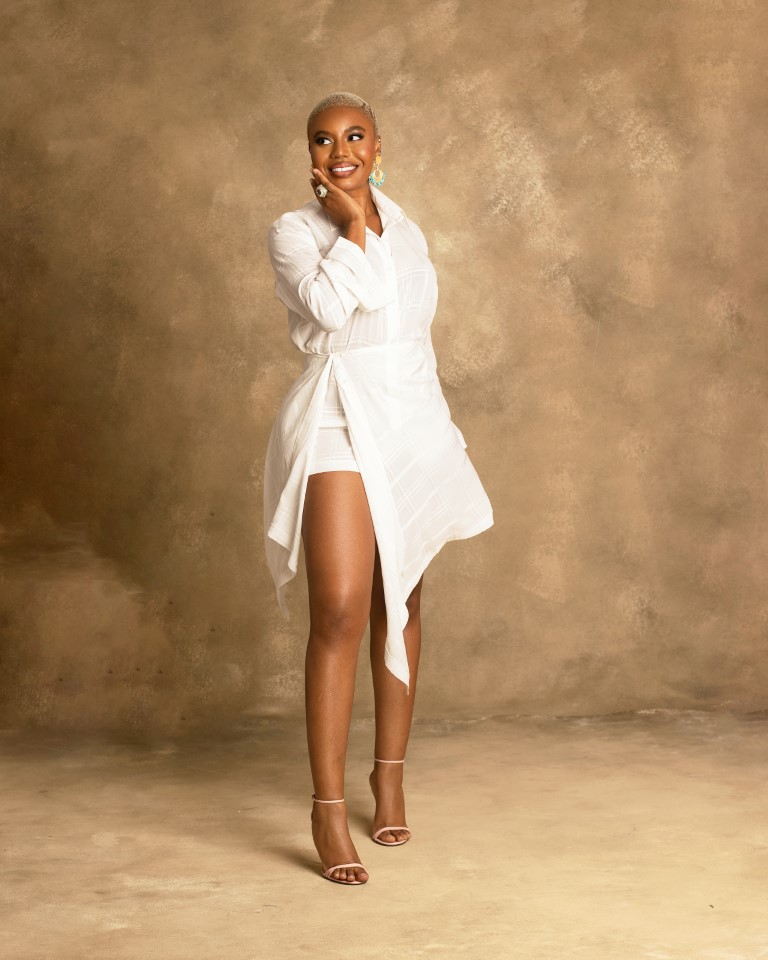
What motivates you?
What motivates me to get outta bed every morning are the people killing it. I get inspired by them and by nature. Inspired by my drive to do better and I just love working. I love being a better me. I love creating opportunities for myself and absolutely exploring life.
The acting business and personal relationships aren’t usually so cut and dry. There are so many feelings to manage; yours and that of your partner and with sexual scenes in a lot of films, how do you balance that many emotions?
That’s where professionalism comes in. I don’t know about other people but for me, it’s just a job and you do your job and you get out. Luckily I’ve worked with professionals who get the job done.
What’s the dating scene like for you in Lagos?
I honestly don’t know. People find love wherever they can. Even when you’re living in Lagos you can find love in Abuja. For me, I’m not out there looking for anything. Obviously, when you’re famous you don’t go around trying to date everybody.
Are you currently seeing anyone?
I’m not open to talking about that.
You have a plaque from The Nigerian Broadcasters Merit award which crowned you the Sexiest On-Air Personality in 2017. When it comes to fashion and looking breathtaking, you always understand the assignment and dress the part. But in an age where most girls invest heavily on hair, it still baffles me that you’ve chosen to keep your hair short. Why?
So for me, why I decided to cut my hair short was because heat wanted to finish me thanks to the wigs and my hair was growing wrongly. So I chose to trim it and regrow but then I liked it. It was black for a minute, so I decided to try a blonde colour and my barber at the time tried till we got the right tone with the C cut in the middle— that went on to become a phenomenon. Now I just switched it up.
Moving on from the loss of a loved one is never easy, in your case, you lost your mum at a really young age. How were you able to pick yourself up and move on?
I just did. It was hard but I just did. At some point in my life, I just said ‘you know what, you have to move on because life goes on, there’s nothing you can do about it.’ It’s happened, it’s happened you just have to find the mind to keep pushing on and see where life takes you.
Having gone through depression and attempted suicide, what advice would you give to people who are battling depression and how can we as Nigerians make it better in regards to mental health?
Well, I don’t know if we can do better because I feel like it is a personal journey. Mental health is personal and the other person can’t really do anything for the other person if they don’t want to do anything for themselves. So I think it’s just basically taking care of yourself. As families do more; be more open to your kids, brothers, sisters, listen to them, talk to them because you never know. Just open your mind more; meditate, take time off, talk when you need to, let the next person know what you’re going through. You never know, someone might just have the kindest words to say to you. I feel like mental health is not taken as seriously as it should be, but it is a thing. And people need to understand that it is almost as important as the clothes that you wear. People just need to read more, research more about it and talk more about it.
Daniel Etim Effiong
As we grow, some things become clearer. We evolve into wiser beings, equipped enough to make decisions that end up curating our living experience. In a love story that started with one of Nollywood’s finest actors, Daniel Etim Effiong’s decision to trust his gut feeling and switch careers, choosing fulfilment over security, has culminated in a brilliant career in the film industry with a beautiful family to boot. In this inerview, the Superstar actor discusses evolution, romance and everything

Your career is different. You quit the presumably lucrative oil and gas industry—where you briefly worked as an engineer—for the film industry. Tell us about that decision.
It was life-changing. I think everyone reaches a tipping point in their lives when you have to come to terms with yourself and make a life-changing decision; that was one of those points for me. I had been doing the arts for a while—in primary, secondary and the university, but for some reason, because I was intelligent, my teachers just figured that intelligent people should be in science class and not the arts. And I had people in my family who were doing very well in oil and gas at the time, so it was natural that I saw that as the goal. I was always being nudged towards the sciences very clearly by everyone who taught me in primary, secondary and university, so it was science class, engineering and then oil and gas. But my arty side was also very active because every opportunity I got, I was either writing or acting in the drama team or being in the debate club, so I was very active in the art. Even in church, I was always in the drama group. Those two worlds existed, but it got to a point in my life when I had to choose because they couldn’t exist side by side anymore. I had this very interesting conversation with my uncle who was the head of the family on my mum’s side and he was like, “Daniel you have to make a choice!” At the time, I am sure he was scaring me into abandoning the art and focusing on this engineering thing because, for him, the art was a distraction. After that talk with him, what I took away from that conversation was “dude, take the plunge. Decide on what you want and go for it and damn the consequences.” So I just jumped off the cliff. I didn’t know if I could survive it, I just went with my gut feeling. It was security versus fulfilment and I chose fulfilment.
It was then a journey that started with going all the way to South Africa to study filmmaking. Why South Africa? Did it ever at the time feel like you were going to be part of the South African movie industry instead of Nigerian?
Because that was what I could afford [laughs]. I had big dreams of going to Hollywood but I was self-funded. No one actually believed in that dream, everyone thought I was silly for leaving that job security for something unstable. So when I was quitting my job, I didn’t tell anyone. When I decided to go study in South Africa, I just knew I had to go and invest in myself and train, so I just started applying. I had to dig into my savings that I’ve accumulated from my years in oil and gas and took the trip. In South Africa, the goal was to just go and study directing and come back, I didn’t plan to stay. I didn’t even know I was going to work in the industry there at all, I thought I was going to do menial jobs like wait tables just to get by if I run out of money. But as God would have it, while I was studying there, opportunities just opened up for me. I started modelling. I had a girlfriend at the time who was head of this modelling agency, and she was like “dude, don’t you want to sign up? They are looking for a face like yours, not the typical South African one.” That was how I got my first job in South Africa as a model. With that, I was getting more acting gigs because it was a character modelling agency, so they were pitching me for more acting gigs when they saw that I could act. I was studying directing, but I was acting on the side. I auditioned for the South African soap opera, Generations: The Legacy and I got the role to act in the series, so it just became this thing. On the other side of me which is my filmmaking side, I applied to this agency in the UK called MOFILM and they signed me up as one of their filmmakers, and I started to direct TV commercials for them. It started as a competition that I applied for, responded to some of their briefs, and I won a grant to make a film and then they signed me up as one of their professional filmmakers. Then they decided to fly me down to Nigeria to film TV commercials. So all of that kicked off as I was a student of South Africa.
Was Ndani TV your first stint?
Actually, I started working with Ndani TV before I went to South Africa. The day I quit my 9-5 (in engineering), was the day I got an email inviting me to GTBank headquarters to come interview for the job position in Ndani TV. I had applied long ago while I was still in engineering, and it didn’t come through until that day when I quit, funny enough. I went for the interview and got the job, I was at Ndani TV for about a year, but all I had was just passion and my “experience” acting in drama teams. I wasn’t trained in filmmaking, I was a content producer at Ndani TV. I came up with some really interesting content there but I just felt it wasn’t enough and I wanted more, I needed to put myself out there more. After about a year, I quit my job at Ndani TV, and that was when I left for South Africa. Then when I came back, I became a freelancer.
At Ndani TV, was it strictly just behind the camera?
So the first contact I had with Ndani TV was as an actor. I was working my engineering 9-5 at the time and during my break time, I ran there because I heard they were auditioning for Gidi Up. So during my break, I took off from work, went to 1004 for the interview and I got the role. I was an oil and gas engineer while I acted in Gidi Up season one.
How did you have the time for rehearsals?
It was during break and after hours. After hours, I’d go there and we would film or rehearse through the night. It was like the two worlds were colliding [laughs]. I would go back to work the next morning with puffy eyes. The two worlds were getting in each other’s way a lot and that was when I decided that I had to choose. At the time, I began to meet people and made enquiries on how to get in full-time. A job opening finally came on the day I quit my 9-5, and I took it. Then I began to work behind the camera. But when it was time to film Gidi Up season two, I was working at Ndani as a content producer when I filmed Gidi Up season two as Folarin.
Which of them would you say you enjoy the most?
It’s actually a difficult question to answer because they do different things for me. I love acting because it puts me out there. I love to work with emotions. My zodiac sign is Cancer, I do a lot with emotions, that’s my tool and acting provides me with that opportunity. However, as an actor, the only thing you have control over is your emotions, your inner world; you have no control of everything else. It is limited for me in terms of creative control. I love it but it limits me as a total creative. Producing gives you more of that freedom, that allowance to play with different elements of creativity in a film. You can work with the actors, writers, directors, and so on. That is the spectrum for me—acting on one side; it is great but it is very limited. Producing which is on the other extreme of the spectrum allows you to pull the strings, you are pretty much the puppet master. However, in between is the directing, writing, editing; the other things that I do and love doing.
It feels like you know a lot about emotions. In 2017 you met your wife. And then you were both involved in a project. What was it like at the early stages of your relationship?
At the time when we started talking, I was in South Africa while she was in New York. She had buzzed me and was like “hey, we should make a film together, I’m in New York Film School, let’s do something together.” And I replied “oh great, I’m in a film school as well, in South Africa.” I love collaborating and meeting new people as well, so we started talking. And one day she was like, “guess what, I’m going to see you in Lagos; I got a job with Ndani TV.” I was like “really?! What are the odds?” [laughs]. I was still in South Africa at the time but they (Ndani TV) flew me down to shoot Gidi Up season three. This time, I was no longer working with Ndani, but I was still an actor on Gidi Up. So to shoot season three, which never aired, they flew me down to Lagos from Johannesburg. She was the production manager on that project and that was when we really started to hit it off, and the rest is history. We met, fell in love and got married.
It is almost Valentine’s day, how would you define ‘Love’ ?
I would say love is a spiritual force. Love is the single most important spiritual energy in the universe. It’s almost like the universe revolves around it, it is one thing that holds everything together, it’s that force. It is what keeps two atoms together in the molecules, it is what bonds human beings. So the way I see it is quite philosophical, but that’s at the highest level. To bring it down to base, love is that thing that drives us to be better people, to be the best version of ourselves. When you love someone, you change, almost like you evolve, there is something it does to you. You want to dress, look and speak better and differently when you start to look at a girl differently. You do things that people call foolish but those are higher things. It is foolish to the normal mind because it is high. You do things out of your way when you are in love.
You paint a very vivid picture. You say it just as well as you act it. You’ve been featured in a few romance movies. Oftentimes we see TV couples transition into real-life couples. How are you able to control your emotions not to lead to actual feelings for the co-star?
I think it comes with the job. I mean you can’t possibly fall in love with everyone you act in romance movies with. Discipline comes with growth. As you grow as an actor and as a human being, discipline is one of those things that you need in your repertoire. It’s one of those things in your toolbox that you have to go around with if you are going to progress in this industry. As you grow, you learn to create a division between the character you play and who you are. On set, you become this character who is totally in love with this person, but when you hear “cut!” you are able to put that in a compartment and lock it up till the next time you are ready to bring him out again. It is a lot of mind work that actors have learned to use to develop. It is part of the job.
…but the kissing scenes are real
Yeah. So let me give you an example; I acted a film where I had about six sex scenes in a day, and the director wanted the scenes to be intense; I’m talking sex with like six different ladies. Very intensely, some of them were grinding on me, I was grinding on some, and I had an actor call me aside and ask me, “how come you never had a hardon throughout the entire episode of filming this?” And I was like “but I possibly couldn’t because sex is mental.” In your mind as an actor, you know what to do. You put yourself in a box and keep yourself there. It’s a lot of mind work, so you have to learn the art of substitution; put yourself behind—yourself that would naturally feel for this person, you put it on the backseat—and then your character has the upper hand. When the character wants to feel, the character can feel, but your natural self that is linked to this character cannot afford to feel. So it’s delicate but it’s possible.
What does your wife think about it (the sex scenes)?
We work together through it all. It is something that we talk about and sometimes she is definitely not comfortable with some of the scenes. Some scenes I have to report myself, not before but after. Sometimes I hint it and be like “this project I’m working on has a lot of sex, so prepare your mind.” I don’t go into details. After I’ve done it, then I can report myself and tell her how the thing went, “Oh, it was terrible! Oh, it was amazing! Oh, you’re going to love it when you see it! Do not watch this one, you’re not going to like it.”
Let’s talk about the Superstar movie that is still showing in cinemas nationwide. Your character’s love interest is Nancy Isime’s character whom, although was with you as a rebound, you shared really good romantic scenes with. Have you ever been a rebound in real-life?
If I was, I didn’t notice. I’m such a damn good lover, I would overshadow any rebound effect. I would be your main [laughs].
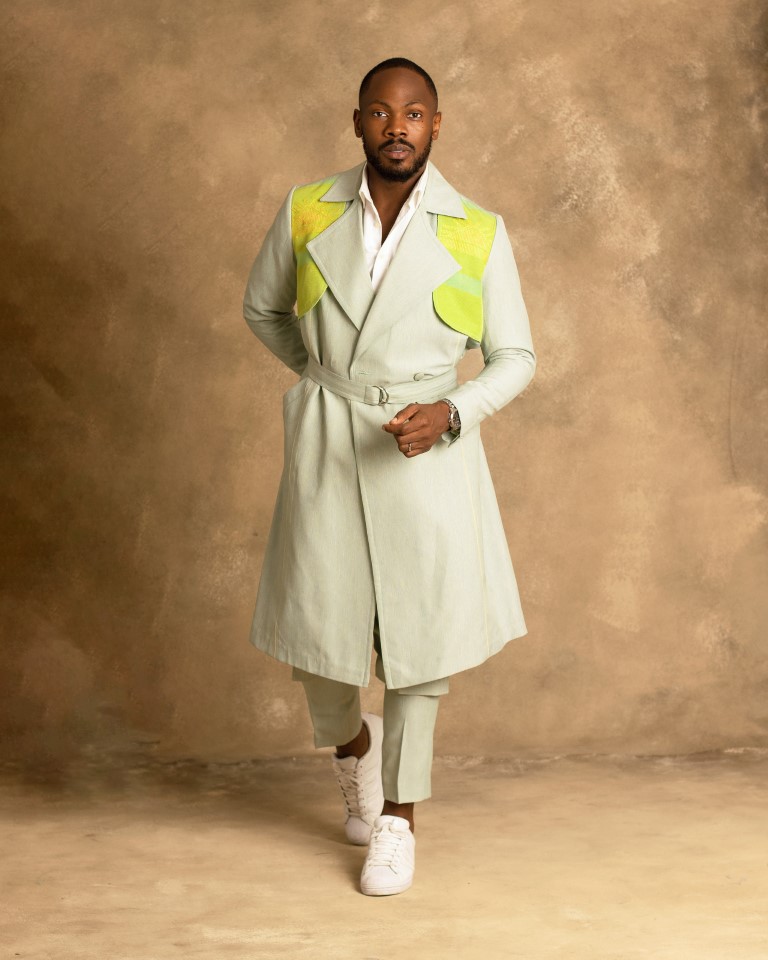
Do you sometimes take elements or lines from your scripts to your real life relationships? If yes, which one?
Not at all. I think it’d be corny, I like to be myself. I think people fall in love with me for who I am rather than trying to be a character in a movie. I find that human beings are very deep and multifaceted, so if you look really deep, you’ll find characters. You’ll find a lot of things that you can work with rather than going external. I think going inward is more powerful and authentic.
Last Valentine’s, Still Falling was showing—you did that with Sharon Ooja. It narrates the ordeals of a toxic relationship. Have you ever been in one? And did your experience influence how well you were able to play that role?
Yes I have. I think in life, you are a product of what you’ve been through and what you’re going through, this will in turn shape how you respond to what you are going to go through. I think we are not separate from our experiences. We are a total of our backgrounds, upbringings and idiosyncrasies. It is all a kaleidoscope of experiences. In view of that, yes, I use my experiences in my films to paint the narratives. How did I deal with toxic relationships? The truth is that, men —especially for men like myself who aren’t very vocal— like to internalise and do things by themselves, it is different to handle.
…you’re not vocal?
No, I’m not. I’m an introvert… largely. And it is difficult for me to even talk about (the toxic relationships) because you know trauma is never really something you deal with and walk away from, it is something you constantly work on. But in dealing with it, first of all, you seek help, you talk about it. Most times what happens is that we live in self-denial and say it is because of something we’ve done but not at all, it is a toxic relationship; are you the toxic one? Is she the toxic one? Are both of you together what’s creating the toxicity? You have to really look at it and be sincere about where you are at that time.
Let’s get away from the toxicity. It’s another Valentine’s day and you’re ‘still falling’ for your wife. Do you have any Valentine’s day plans?
Do you know I thought about that today [laughs]. I’m still thinking about it and nothing concrete yet but I’m thinking of different ideas. I’m travelling on Valentine’s day by the way (for work), at night, so I have to make the day quite memorable for us. It has to be worth it, so I’m working on something.
Congratulations on the birth of your son. It must feel great.
Oh yeah, it feels great to have an offspring. When people ask me how it feels to have a son, I often tell them “so you look at your son and you see a version of yourself that is so pure, so innocent and so open. It’s like a sponge ready to soak in everything you throw at it. That humbles you and makes you want to do things right. It’s always an opportunity to do things differently and right your wrongs in life. You know because you’re looking at this child and thinking, as a father or parent of this child, you have one of the highest chances of influencing the child’s life. And if you’re a thinker, you look 20 years down the line and you’re like “whatever I do today will affect this child.” You immediately start to self-edit and always watch yourself. I feel enormous responsibility everytime I look at this child, but it gets easier the more children you have. It happened with my daughter and it’s different for sons because it’s like you, and you have the experience of being a man. It’s interesting and life-changing, you’ll just be like “I’ve gotta get it right.”
A son and a daughter, is that it? Are you looking to expand the Effiong family?
Who knows? I really am fine with two kids, but I’m not the only one who’s invested in this thing. It is a joint venture and so it has to be a two-way conversation.
Are there any projects we should look forward to this year?
A lot of projects. I worked so hard last year, so this year I plan to do less work and make more money. The strategy is to be more selective and choose carefully the kind of jobs that I’m involved in. But the truth is I’m developing other sides to the brand. I want to make more films this year as a producer and director. I also want to develop avenues where I can earn without necessarily being present there, so I have time to spend with my family. That’s the goal for this year.
by Tilewa Kazeem and Kehindé Fagbule
Self-identifies as a middle child between millennials and the gen Z, began writing as a 14 year-old. Born and raised in Lagos where he would go on to obtain a degree in the University of Lagos, he mainly draws inspiration from societal issues and the ills within. His "live and let live" mantra shapes his thought process as he writes about lifestyle from a place of empathy and emotional intelligence. When he is not writing, he is very invested in football and sociopolitical commentary on social media.




